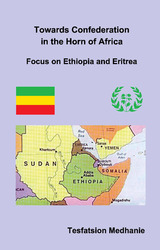| Areas | |
|---|---|
| Serie de libros (97) |
1382
|
| Nachhaltigkeit |
3
|
| Gesundheitswesen |
1
|
| Letra |
2377
|
| Medienwissenschaften | 16 |
| Teología | 57 |
| Filosofía | 102 |
| Derecho | 424 |
| Economía | 855 |
| Ciencias sociales | 418 |
| Ciencias del deporte | 48 |
| Psicología | 233 |
| Educación | 190 |
| Historia | 183 |
| Arte | 111 |
| Ciencias culturales | 166 |
| Literatur | 117 |
| Lingüística | 89 |
| Ciencias Naturales |
5408
|
| Ciencias Ingeniería |
1798
|
| General |
98
|
|
Leitlinien Unfallchirurgie
5. Auflage bestellen |
|
Erweiterte Suche
Towards Confederation in the Horn of Africa (Tienda española)
Focus on Ethiopia and Eritrea
Tesfatsion Medhanie (Autor)Perhaps this book will be quickly dismissed since it advocates a confederation of the main states in the Horn of Africa at a time when this seems most unlikely because of internal conflicts, proxy wars and serious regional discord. Readers only need to be reminded of the “durable” legal racism of apartheid, the concrete walls of Berlin, and the endless killing fields of Rwanda to regain your attention to address what seems “impossible” to conclude or transform. African “mammy wagons” proclaim “No Condition is Permanent.”
Medhanie’s imaginative, ‘out-of-the box’ proposal launches the dreams of a new era. Yes, this will not be happening today but who imagined Europe with one currency and a serious European Union? Who imagined Africa with increased capacity for self governance and peace-making? Who imagined in 1940 that the continent of Africa would be fully DE-colonized in the next fifty years? Who imagined that the President of the United States would have a Luo father? Dreams of the present do, in fact, sometimes become the realities in the future.
Already regional confederations in Africa, such as ECOWAS, COMESA and SADC are rapidly evolving. Yes there are bloody conflicts in Africa, but this is the case in only 5 or 6 of Africa’s 53 nations; for much of the last century Europe was even more consumed in wars. Mengistu Haile Marium is gone for refuge in an African pariah nation; Charles Taylor is in custody for his war crimes in Liberia; Mobutu, Bongo, Bokassa, Iddi Amin, Nimieri and Haile Sellasie are all dead. Clearly Medhanie is imagining a time when his nemesis Afwerki will be joining this crowd of ex-despots and dictators.
True, African confederations have had successors and failures. By studying these in the light of comparative history and politics, the author has revealed the possibilities and obstacles as well as the natural popular desires for economic intercourse, cultural exchange and functional regional complementarities. Africa has already produced visionary leaders such as Mandela, Ghandi, Cabral, Nkrumah, Tutu and Nyerere. No doubt the next generation will be coming along to replace the current round of localized instability and insecurity. This book is focused on an Afro-optimist view of the future, but it certainly does not overlook the Afro-pessimists who are riveted in a number of grave present realities of human rights violations and war crimes. Yet, more and more African nations are turning to multi-party democracy with orderly transfer of power and are meeting the stiff standards of the Millennium Challenge. Yes, there is a long way still to go but the first steps of this long march are already taken.
And despite thee several conflicts most are internal or civil and very few are formally inter-state wars. Parallel to these, only one or two national boundaries have been shifted in the post-colonial epoch (e.g. Nigeria and Cameroon; Eritrea and Ethiopia, and perhaps Sudan in 2011). Now, violations of the rules of wars are more subject to international judicial review and prosecution.
Being Eritrean, Medhanie focuses especially on Eritrea, Ethiopia, and Somalia in these particularly tumultuous times in this region. Despite this violent period, Medhanie insists that this very low point will ultimately come to an end with lessons learned and more leadership changes are expected and needed. Even though Medhanie considers that Eritrea is a virtually ‘failed state’ and that the Ethiopian Constitutional Right (Article 39) for national self-determination are honored more in the breach than in practice, there is still hope and political possibility within the African Union. Even Muslim-Christian relations have had their regional problems, but this is not a major fault line at present.
In short, this is a marvelous and stimulating idea born at the wrong time, but if nourished and kept alive for a brighter future it can germinate and grow rapidly. Certainly the fears of the three major nations of the Horn make for a rocky and salty political soil. Even famous enemies can become future partners if linked to a project founded in mutual respects, mutual interest, regional security, and common commitment to peace. Certainly this is not a book describing the present, but without a book like this we will have no milestones or destinations in the Africa of the future.
by Richard Lobban, Emeritus Professor of Anthropology, Rhode Island College
| ISBN-10 (Impresion) | 3867278814 |
| ISBN-13 (Impresion) | 9783867278812 |
| Idioma | Inglés |
| Numero de paginas | 166 |
| Edicion | 1 Aufl. |
| Volumen | 0 |
| Lugar de publicacion | Göttingen |
| Lugar de la disertacion | Universität Bremen |
| Fecha de publicacion | 11.02.2009 |
| Clasificacion simple | Tesis doctoral |
| Area |
Economía
|








